外研版必修1 Module 5 A Lesson in a Lab Language points课件(36张ppt)
文档属性
| 名称 | 外研版必修1 Module 5 A Lesson in a Lab Language points课件(36张ppt) | 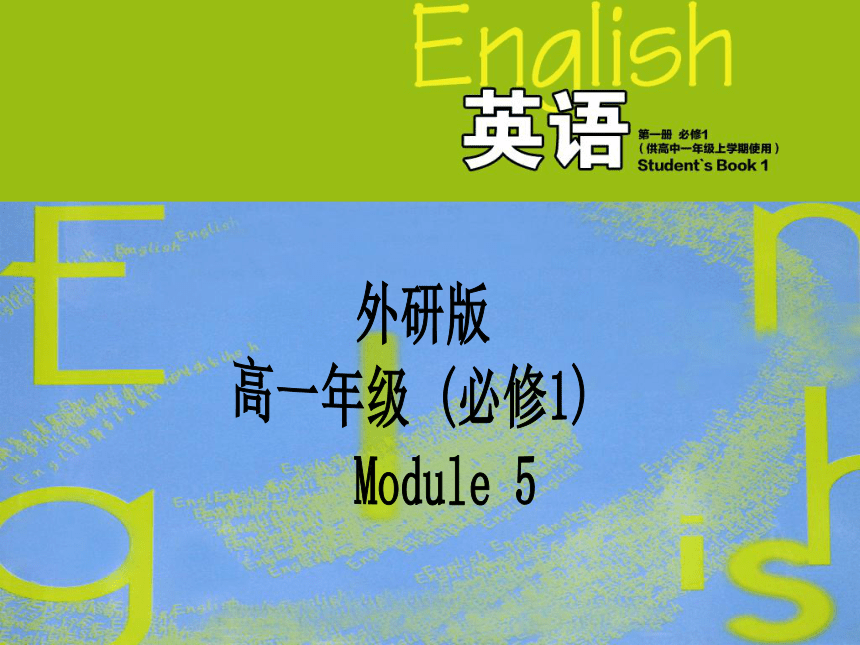 | |
| 格式 | zip | ||
| 文件大小 | 1.8MB | ||
| 资源类型 | 教案 | ||
| 版本资源 | 外研版 | ||
| 科目 | 英语 | ||
| 更新时间 | 2022-01-27 14:27:58 | ||
图片预览

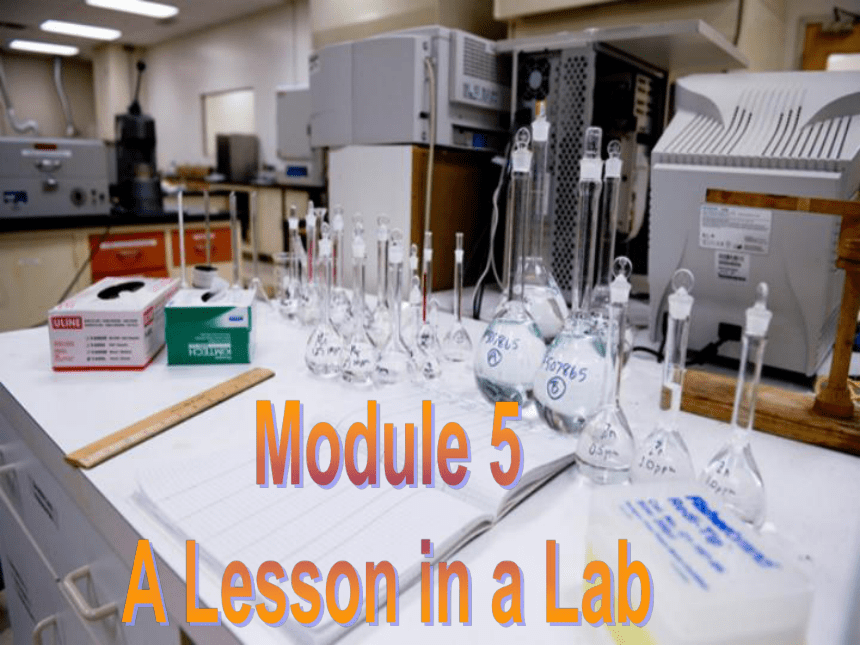

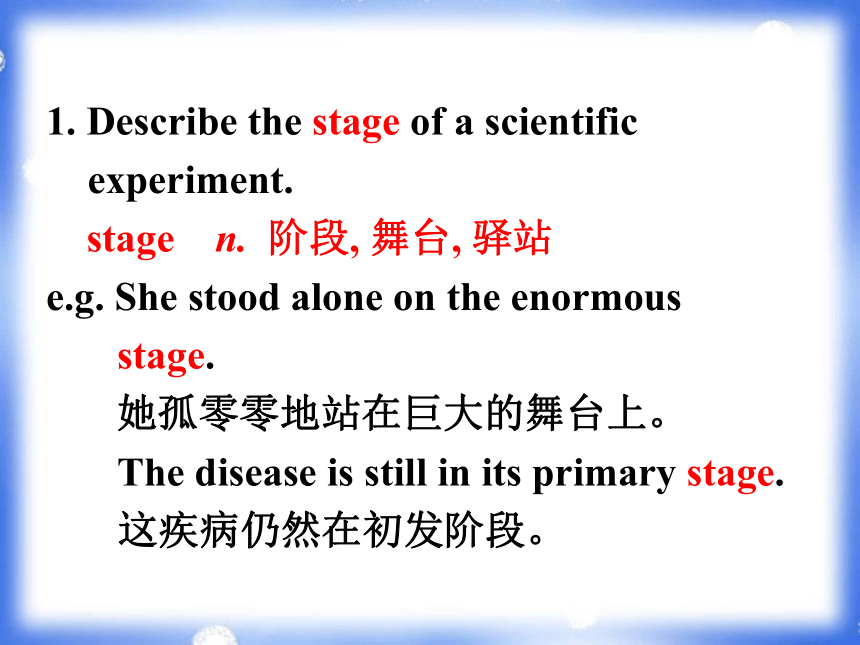
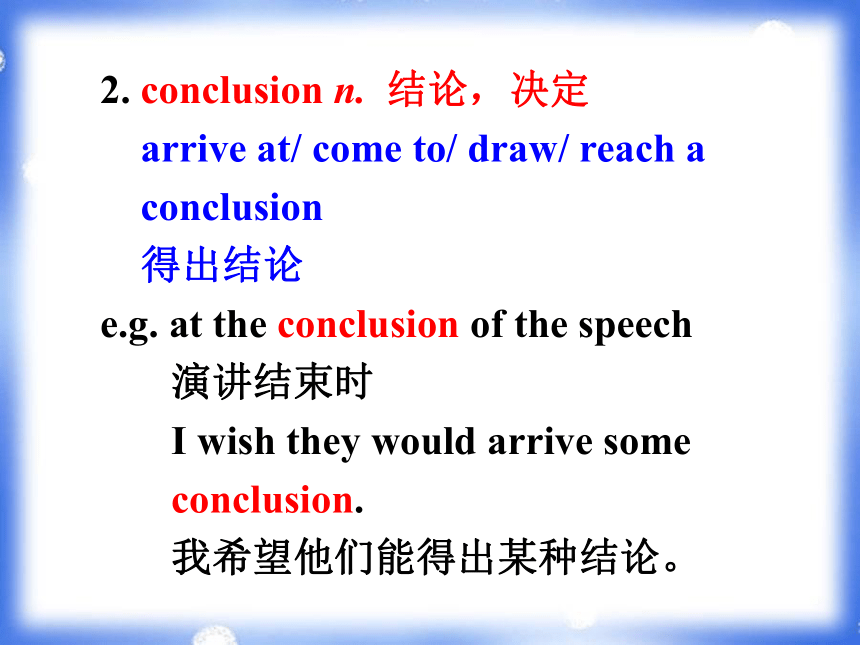
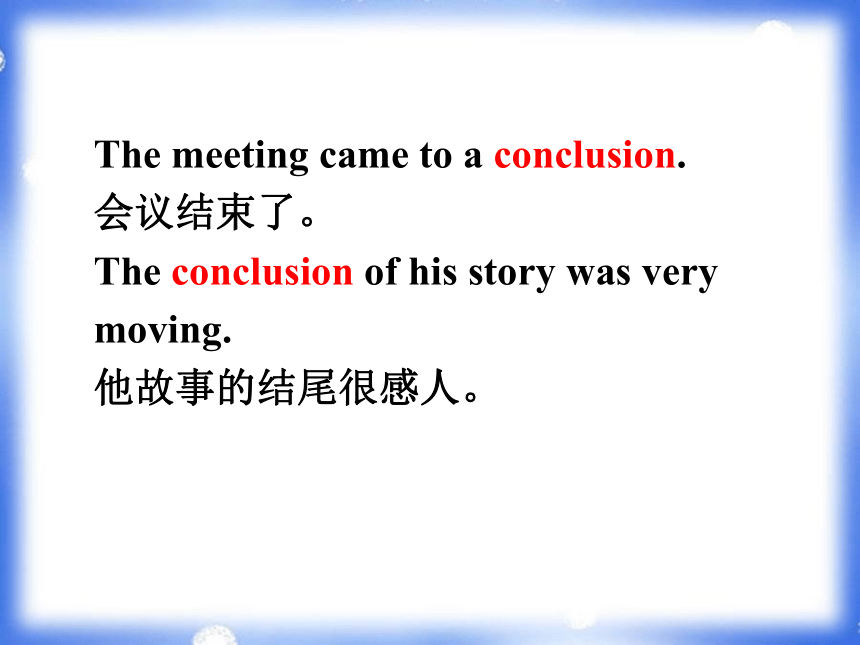
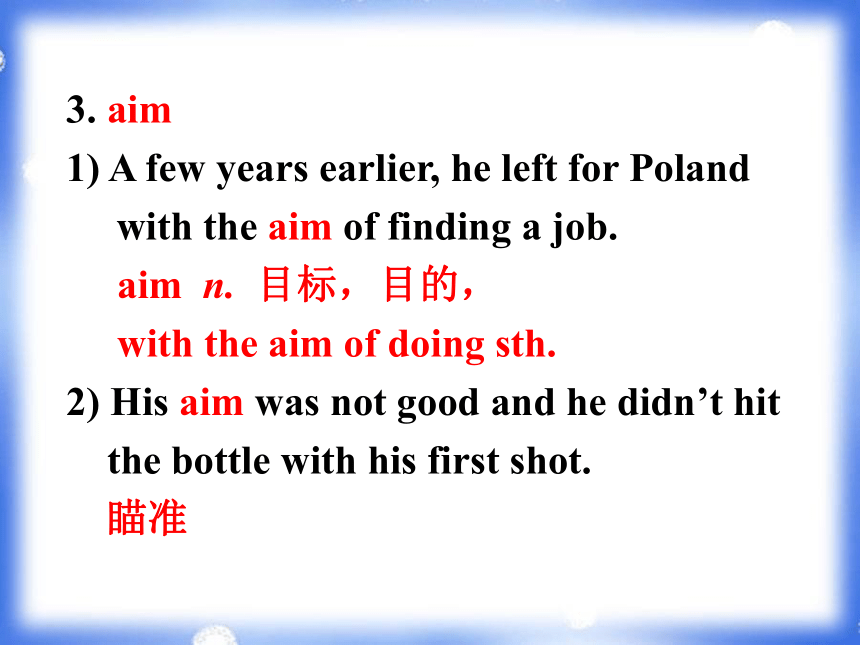


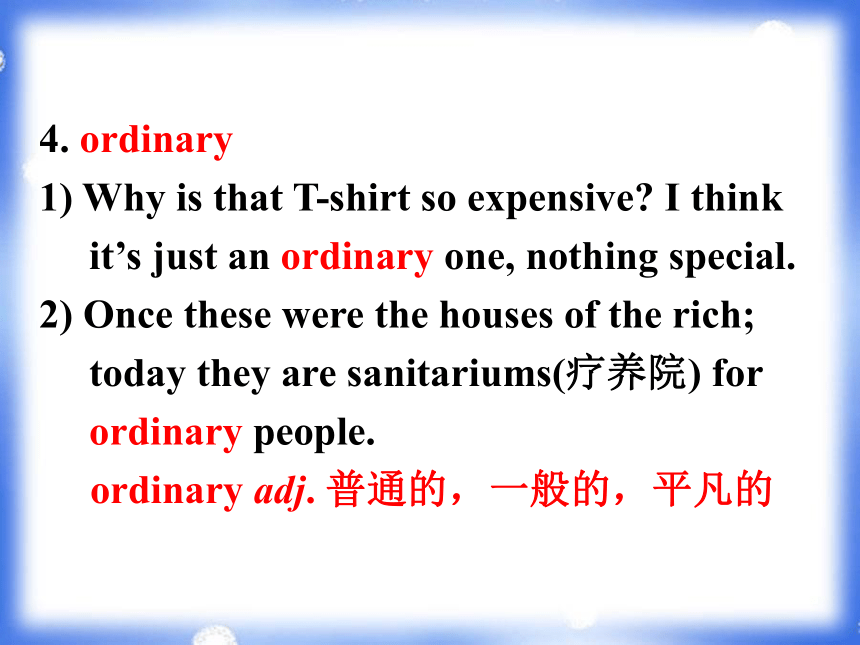

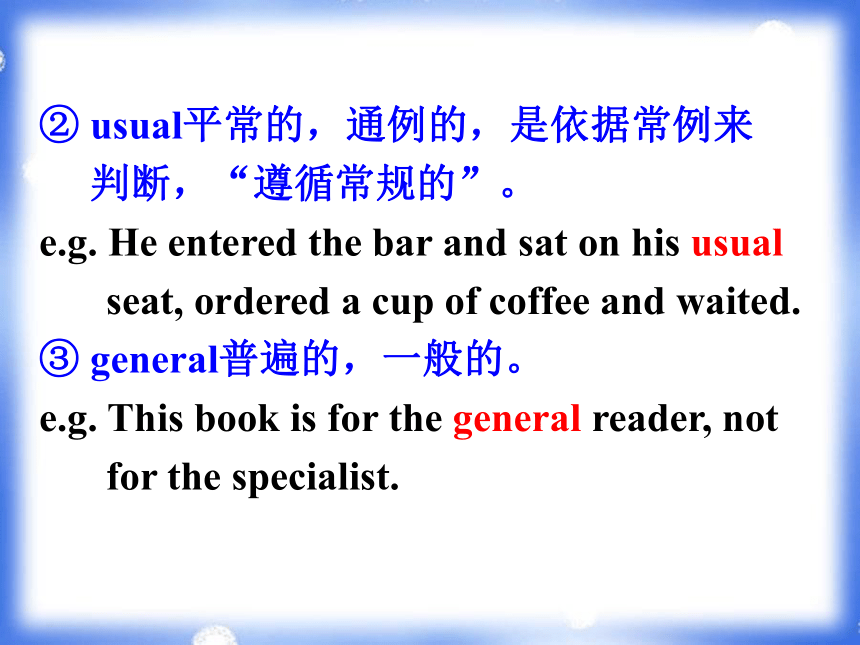
文档简介
(共36张PPT)
1. Describe the stage of a scientific experiment.
stage n. 阶段, 舞台, 驿站
e.g. She stood alone on the enormous
stage.
她孤零零地站在巨大的舞台上。
The disease is still in its primary stage. 这疾病仍然在初发阶段。
2. conclusion n. 结论,决定
arrive at/ come to/ draw/ reach a
conclusion
得出结论
e.g. at the conclusion of the speech
演讲结束时
I wish they would arrive some
conclusion.
我希望他们能得出某种结论。
The meeting came to a conclusion.
会议结束了。
The conclusion of his story was very moving.
他故事的结尾很感人。
3. aim
1) A few years earlier, he left for Poland with the aim of finding a job.
aim n. 目标,目的,
with the aim of doing sth.
2) His aim was not good and he didn’t hit
the bottle with his first shot.
瞄准
3) He aimed at the bird, fired but missed
it.
aim v. 瞄准 (at)
4) The company is aiming at training / to
train everyone by the end of this month.
力争做到,可构成短语aim at doing
sth. / aim to do sth.”。
5) The book is aimed at children under 5 years old.
6) These measures are aimed at protecting the environment.
be aimed at ...意思分别为“针对,对象是”和“目的是,旨在”。
4. ordinary
1) Why is that T-shirt so expensive I think it’s just an ordinary one, nothing special.
2) Once these were the houses of the rich; today they are sanitariums(疗养院) for ordinary people.
ordinary adj. 普通的,一般的,平凡的
辨析
common, usual, general, ordinary
都有“普遍的,普通的”之意,其区别是:
① common多用于指物,侧重常见的,不足为奇的。
e.g. Contractions are much more common
in speech than in writing.
② usual平常的,通例的,是依据常例来
判断,“遵循常规的”。
e.g. He entered the bar and sat on his usual seat, ordered a cup of coffee and waited.
③ general普遍的,一般的。
e.g. This book is for the general reader, not for the specialist.
④ ordinary用于物,指平淡无奇的,一般的;用于人,指无特别之处,平凡的。
e.g. I spent an ordinary day in my
office, just reading newspapers
and chatting with my friends.
5. When we use metals, it is important to
know how they react with different
substances, …
react with 意为“对……起反应”。
e.g. Iron reacts with water and air to
produce rust.
铁与水和空气起化学反应而生锈。
6. The reaction of metals with these
substances can be put in order.
in order意为“井然有序的;整理好
的” 。
e.g. She keeps the room in order.
她把房间整理得很好。
I put my room in order.
我把自己的房间整理好。
此外,in order还有“依照次序; (机器等)情况良好”的意思。
e.g. Call the names in order.
请依照次序叫名字。
My bicycle is in order.
我的自行车情况良好。
order n. 顺序,订单,命令,秩序
e.g. Some teachers find it difficult to
keep order in their classes. 有些教师觉得课堂秩序很难维持。
He gave his order to the waiter. 他把他点的东西告诉服务员了。
v. 命令;定购;点餐
e.g. He ordered three new suits for himself. 他给自己定购了三套西装。
I’ve ordered egg and chips for you. 我给你点了鸡蛋和炸土豆条。
Don’t order it run too much.
不要命令它跑太多的路。
7. Add some oil to the water.
add ... to ... 把……添加到……上;
add to 增加,增添;
add up to 总共有,意味着。
That’s all I have to say. Is there anything
that you’d like to _____, Terry
A. talk B. require
C. add D. deliver
所填动词的宾语是anything,而talk意为“讲话,交谈,谈论”时为不及物动词;require需要,要求,不合句意;deliver发言,发表(演说),与语境不符;add补充说。前一分句句意“我要讲的就这么多。”可知询问Terry有什么想补充的。
各色太阳伞给夏日的街头平添了活泼
的气氛。(add to)
Colorful umbrellas add to a lively
atmosphere in the summer streets.
The engine of the ship was out of order and the bad weather _____ the helplessness of the crew at sea.
A. added to B. resulted from
C. turned out D. made up
add to 增加,增添;
result from 由…产生;
turn out 结果是;
make up 组成。
根据句意“轮船发动机失灵,恶劣天气又增加了海上船员的无助”可知选A。
8. This will keep air out of the water.
keep sb./sth. out of 意为“不让某人/某物进入某处”。
e.g. Keep that dog out of my study.
别让那条狗进我的书房。
She wore a hat to keep the sun out
of her eyes.
她戴着帽子遮阳, 保护眼睛。
keep 词组:
keep away (from) 不接近,避开,远离
keep back 阻止,扣留,隐瞒
keep in mind 记住
keep in touch with… 与…保持联系
keep off 不接近,远离
keep on doing 继续,不停地做
keep out 使…不入内
keep up with… 赶上,跟上
9. Iron does not rust in air-free water.
air-free adj. 没有空气的
-free构成形容词或副词,“无,免除”。
e.g. carefree 无忧无虑的; 无牵挂的
duty-free 免税的
disease-free 无病的
worry-free 无忧无愁的
10. Half-fill a test tube with water…
fill …with 使……满;填满
e.g. He filled the bottle with water.
他把瓶子装满水。
Her eyes were filled with tears.
她热泪盈眶。
The result filled his heart with despair.
这样的结果使他心中充满失望。
1. 在图书馆,图书通常是按作者姓氏的第一个字母顺序排列的。
In the library, books are usually put in the order of the first letter of the writers’ surname.
2. 他桌子上的书摆放整齐有序。
The books on his desk are in order.
Translate the following sentences.
3. 请按照正确的顺序将下列单词排列。
Please put the following words in the correct order.
4. 我们这次是按照年龄顺序而不是按照身高站队。
This time we stood in line in the order of age instead of in the order of height.
Finish the following sentences.
1. ___ ____ __ ______ (很难想象) what a world without electricity is like.
2. We ____ __ ___ _________ (得出这个结论) that he’d been lying.
3. Don’t ___ __ (混合) the two kinds of vegetable seeds. They are much alike.
It’s hard to imagine
came to the conclusion
mix up
4. ___________________________ (目的是……的一个实验) finding out how copper _____ ____ (反应) water will be done next lesson.
5. The _________________________(生锈的电器) can’t work any more.
An experiment with the aim of
reacts with
rusting electrical equipment
6. I helped him _____ ___ __ ___ _______ (在秤上称鱼) in the store.
7. I’ve just finished mopping the floor. _____ the dog ___ __ (别让……进入) the room!
8. _____________ __ ___ ____ ____ (四分之三的水) drunk by the dog.
weigh fish on the balance
Keep
out of
Three-quarters of the water was
Choose the correct form of the words to finish the sentences.
add, add ... to ..., add to, add up to
1. The beauty of the river ______ the attraction of the place.
2. I want to know whether my name ____________________ the list.
adds to
was / has been added to
3. —What is the cost of the project
—The total number _________ 270 million yuan.
4. If the mixture seems dry, ____ water.
adds up to
add
Do exercise 8 on page 93.
1. Describe the stage of a scientific experiment.
stage n. 阶段, 舞台, 驿站
e.g. She stood alone on the enormous
stage.
她孤零零地站在巨大的舞台上。
The disease is still in its primary stage. 这疾病仍然在初发阶段。
2. conclusion n. 结论,决定
arrive at/ come to/ draw/ reach a
conclusion
得出结论
e.g. at the conclusion of the speech
演讲结束时
I wish they would arrive some
conclusion.
我希望他们能得出某种结论。
The meeting came to a conclusion.
会议结束了。
The conclusion of his story was very moving.
他故事的结尾很感人。
3. aim
1) A few years earlier, he left for Poland with the aim of finding a job.
aim n. 目标,目的,
with the aim of doing sth.
2) His aim was not good and he didn’t hit
the bottle with his first shot.
瞄准
3) He aimed at the bird, fired but missed
it.
aim v. 瞄准 (at)
4) The company is aiming at training / to
train everyone by the end of this month.
力争做到,可构成短语aim at doing
sth. / aim to do sth.”。
5) The book is aimed at children under 5 years old.
6) These measures are aimed at protecting the environment.
be aimed at ...意思分别为“针对,对象是”和“目的是,旨在”。
4. ordinary
1) Why is that T-shirt so expensive I think it’s just an ordinary one, nothing special.
2) Once these were the houses of the rich; today they are sanitariums(疗养院) for ordinary people.
ordinary adj. 普通的,一般的,平凡的
辨析
common, usual, general, ordinary
都有“普遍的,普通的”之意,其区别是:
① common多用于指物,侧重常见的,不足为奇的。
e.g. Contractions are much more common
in speech than in writing.
② usual平常的,通例的,是依据常例来
判断,“遵循常规的”。
e.g. He entered the bar and sat on his usual seat, ordered a cup of coffee and waited.
③ general普遍的,一般的。
e.g. This book is for the general reader, not for the specialist.
④ ordinary用于物,指平淡无奇的,一般的;用于人,指无特别之处,平凡的。
e.g. I spent an ordinary day in my
office, just reading newspapers
and chatting with my friends.
5. When we use metals, it is important to
know how they react with different
substances, …
react with 意为“对……起反应”。
e.g. Iron reacts with water and air to
produce rust.
铁与水和空气起化学反应而生锈。
6. The reaction of metals with these
substances can be put in order.
in order意为“井然有序的;整理好
的” 。
e.g. She keeps the room in order.
她把房间整理得很好。
I put my room in order.
我把自己的房间整理好。
此外,in order还有“依照次序; (机器等)情况良好”的意思。
e.g. Call the names in order.
请依照次序叫名字。
My bicycle is in order.
我的自行车情况良好。
order n. 顺序,订单,命令,秩序
e.g. Some teachers find it difficult to
keep order in their classes. 有些教师觉得课堂秩序很难维持。
He gave his order to the waiter. 他把他点的东西告诉服务员了。
v. 命令;定购;点餐
e.g. He ordered three new suits for himself. 他给自己定购了三套西装。
I’ve ordered egg and chips for you. 我给你点了鸡蛋和炸土豆条。
Don’t order it run too much.
不要命令它跑太多的路。
7. Add some oil to the water.
add ... to ... 把……添加到……上;
add to 增加,增添;
add up to 总共有,意味着。
That’s all I have to say. Is there anything
that you’d like to _____, Terry
A. talk B. require
C. add D. deliver
所填动词的宾语是anything,而talk意为“讲话,交谈,谈论”时为不及物动词;require需要,要求,不合句意;deliver发言,发表(演说),与语境不符;add补充说。前一分句句意“我要讲的就这么多。”可知询问Terry有什么想补充的。
各色太阳伞给夏日的街头平添了活泼
的气氛。(add to)
Colorful umbrellas add to a lively
atmosphere in the summer streets.
The engine of the ship was out of order and the bad weather _____ the helplessness of the crew at sea.
A. added to B. resulted from
C. turned out D. made up
add to 增加,增添;
result from 由…产生;
turn out 结果是;
make up 组成。
根据句意“轮船发动机失灵,恶劣天气又增加了海上船员的无助”可知选A。
8. This will keep air out of the water.
keep sb./sth. out of 意为“不让某人/某物进入某处”。
e.g. Keep that dog out of my study.
别让那条狗进我的书房。
She wore a hat to keep the sun out
of her eyes.
她戴着帽子遮阳, 保护眼睛。
keep 词组:
keep away (from) 不接近,避开,远离
keep back 阻止,扣留,隐瞒
keep in mind 记住
keep in touch with… 与…保持联系
keep off 不接近,远离
keep on doing 继续,不停地做
keep out 使…不入内
keep up with… 赶上,跟上
9. Iron does not rust in air-free water.
air-free adj. 没有空气的
-free构成形容词或副词,“无,免除”。
e.g. carefree 无忧无虑的; 无牵挂的
duty-free 免税的
disease-free 无病的
worry-free 无忧无愁的
10. Half-fill a test tube with water…
fill …with 使……满;填满
e.g. He filled the bottle with water.
他把瓶子装满水。
Her eyes were filled with tears.
她热泪盈眶。
The result filled his heart with despair.
这样的结果使他心中充满失望。
1. 在图书馆,图书通常是按作者姓氏的第一个字母顺序排列的。
In the library, books are usually put in the order of the first letter of the writers’ surname.
2. 他桌子上的书摆放整齐有序。
The books on his desk are in order.
Translate the following sentences.
3. 请按照正确的顺序将下列单词排列。
Please put the following words in the correct order.
4. 我们这次是按照年龄顺序而不是按照身高站队。
This time we stood in line in the order of age instead of in the order of height.
Finish the following sentences.
1. ___ ____ __ ______ (很难想象) what a world without electricity is like.
2. We ____ __ ___ _________ (得出这个结论) that he’d been lying.
3. Don’t ___ __ (混合) the two kinds of vegetable seeds. They are much alike.
It’s hard to imagine
came to the conclusion
mix up
4. ___________________________ (目的是……的一个实验) finding out how copper _____ ____ (反应) water will be done next lesson.
5. The _________________________(生锈的电器) can’t work any more.
An experiment with the aim of
reacts with
rusting electrical equipment
6. I helped him _____ ___ __ ___ _______ (在秤上称鱼) in the store.
7. I’ve just finished mopping the floor. _____ the dog ___ __ (别让……进入) the room!
8. _____________ __ ___ ____ ____ (四分之三的水) drunk by the dog.
weigh fish on the balance
Keep
out of
Three-quarters of the water was
Choose the correct form of the words to finish the sentences.
add, add ... to ..., add to, add up to
1. The beauty of the river ______ the attraction of the place.
2. I want to know whether my name ____________________ the list.
adds to
was / has been added to
3. —What is the cost of the project
—The total number _________ 270 million yuan.
4. If the mixture seems dry, ____ water.
adds up to
add
Do exercise 8 on page 93.
